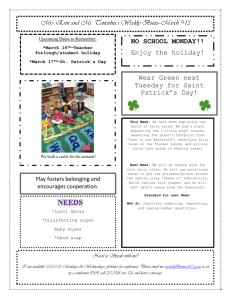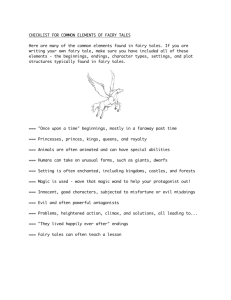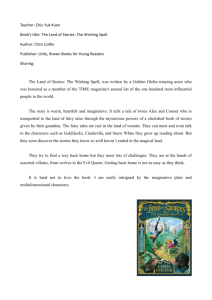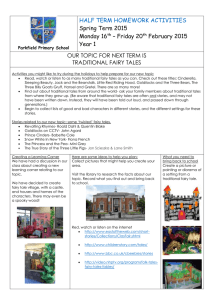Children's Literature Fall 2014 – Hunter College Instructor: Isabel
advertisement
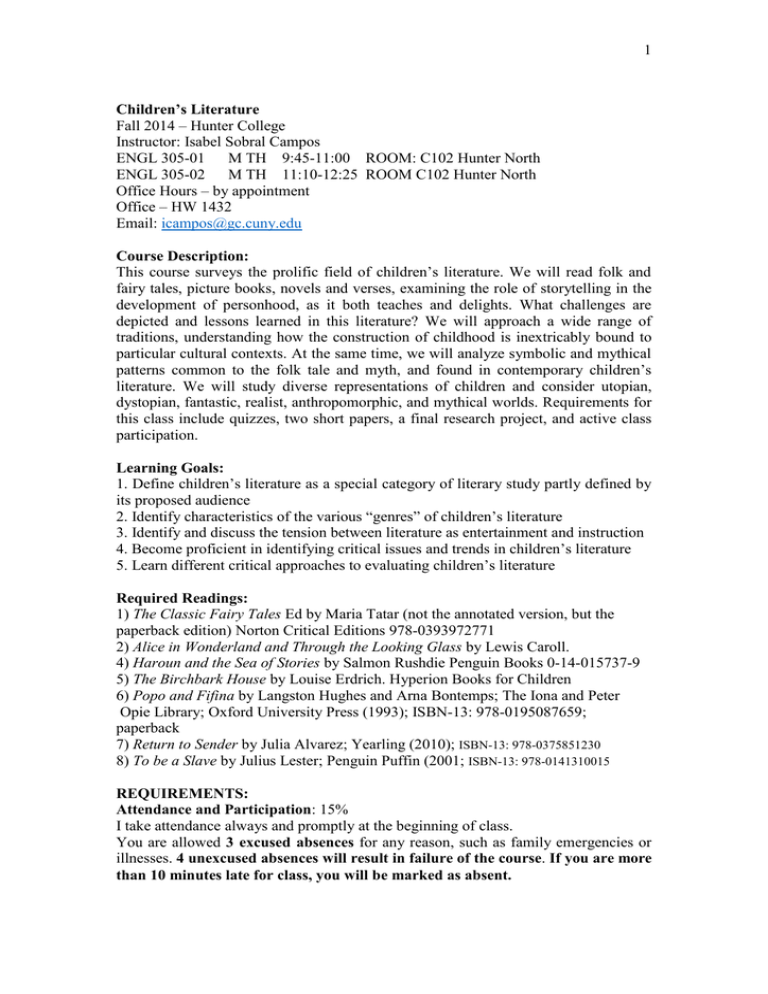
1 Children’s Literature Fall 2014 – Hunter College Instructor: Isabel Sobral Campos ENGL 305-01 M TH 9:45-11:00 ROOM: C102 Hunter North ENGL 305-02 M TH 11:10-12:25 ROOM C102 Hunter North Office Hours – by appointment Office – HW 1432 Email: icampos@gc.cuny.edu Course Description: This course surveys the prolific field of children’s literature. We will read folk and fairy tales, picture books, novels and verses, examining the role of storytelling in the development of personhood, as it both teaches and delights. What challenges are depicted and lessons learned in this literature? We will approach a wide range of traditions, understanding how the construction of childhood is inextricably bound to particular cultural contexts. At the same time, we will analyze symbolic and mythical patterns common to the folk tale and myth, and found in contemporary children’s literature. We will study diverse representations of children and consider utopian, dystopian, fantastic, realist, anthropomorphic, and mythical worlds. Requirements for this class include quizzes, two short papers, a final research project, and active class participation. Learning Goals: 1. Define children’s literature as a special category of literary study partly defined by its proposed audience 2. Identify characteristics of the various “genres” of children’s literature 3. Identify and discuss the tension between literature as entertainment and instruction 4. Become proficient in identifying critical issues and trends in children’s literature 5. Learn different critical approaches to evaluating children’s literature Required Readings: 1) The Classic Fairy Tales Ed by Maria Tatar (not the annotated version, but the paperback edition) Norton Critical Editions 978-0393972771 2) Alice in Wonderland and Through the Looking Glass by Lewis Caroll. 4) Haroun and the Sea of Stories by Salmon Rushdie Penguin Books 0-14-015737-9 5) The Birchbark House by Louise Erdrich. Hyperion Books for Children 6) Popo and Fifina by Langston Hughes and Arna Bontemps; The Iona and Peter Opie Library; Oxford University Press (1993); ISBN-13: 978-0195087659; paperback 7) Return to Sender by Julia Alvarez; Yearling (2010); ISBN-13: 978-0375851230 8) To be a Slave by Julius Lester; Penguin Puffin (2001; ISBN-13: 978-0141310015 REQUIREMENTS: Attendance and Participation: 15% I take attendance always and promptly at the beginning of class. You are allowed 3 excused absences for any reason, such as family emergencies or illnesses. 4 unexcused absences will result in failure of the course. If you are more than 10 minutes late for class, you will be marked as absent. 2 You should come to class with questions, pertinent insights about the reading, and willing to engage in class discussions. Reading and Quizzes: 15% It is imperative that you read the assignments so you can participate in class discussions. To this end there will be surprise quizzes at the beginning of class throughout the semester. Missing, or scoring poorly, in a significant portion of these will affect your final grade substantially. First Essay (20%) Second Essay (20%); and Final Essay (30%) You are required to write three essays. I will distribute precise guidelines for these paper assignments well in advance. You must use MLA citation style. All papers must be typed, double-spaced, in 12-point, Times New Roman font and with one-inch margins on each side. No late papers will be accepted. You will submit your essays through BB “safe assign.” Be advised that this is a precaution against plagiarism. I will also urge you to make an appointment with me to discuss each essay. CLASS CONDUCT: Please turn off your cell phones. You can use electronic devices during class time only for the purposes of note taking. You can bring drinks to class. Please avoid bringing food that is messy or disturbs class in any way: loud packages, pungent food, etc; use common sense here. Be thoughtful and courteous to your colleagues during class discussions and always bring the relevant text to class. ACADEMIC DISHONESTY: Hunter College regards acts of academic dishonesty (e.g. plagiarism, cheating on examinations, obtaining unfair advantage, and falsification of records and official documents) as serious offenses against the values of intellectual honesty. The college is committed to enforcing the CUNY Policy on Academic Integrity and will pursue cases of academic dishonesty according to Hunter College Integrity Procedures. DISABILITIES: In Compliance with the American Disability Act of 1990 (ADA) and with Section 504 of the Rehabilitation Act of 1973, Hunter College is committed to ensuring educational parity and accommodations for all students with documented disabilities and/or medical conditions. It is recommended that all students with documented disabilities (Emotional, Medical, Physical and/or Learning) consult the office of Access/ABILITY located in Room E1124 to secure necessary academic accommodations. For further information and assistance, please call 212-772-4857 /TTY(212-650-3230) T= the Norton Anthology edited by Maria Tatar BB= Blackboard Week 1 8/28 – Introduction to Course Week 2 9/1 – No Class (Labor Day) 9/4 – Introduction to the fairy tale 1) C.S. Lewis (BB) 3 2) Shavit “The Concept of Childhood and Children’s Folktales…” (T) Week 3 9/8 – 1) Little Red Riding Hood – Introduction; Perrault; Brothers Grimm; Italo Calvino; Roald Dahl (T) 2) Tatar’s introduction to “The Classic Fairy Tales” 3) Zipes - “Setting Standards for Civilization Through Fairy Tales” (BB) 9/11 – 1) Beauty and the Beast – Introduction; de Beaumont; Grimm; Angela Carter; Urashima the Fisherman 2) Rowe – “To Spin a Yarn: The Female Voice In Folklore and Fairy Tale” (T) 3) Ovid – “The Story of Philomela” (BB) Week 4 9/15 – 1) Snow White – Introduction; Grimm; Giambattista Basile; Sexton (T) 2) Gilbert and Gubar – “Snow White and Her Wicked Stepmother” (T) 9/18 – 1) Hansel and Gretel – Introduction; Grimm (2); Perrault; Joseph Jacobs ”The Rose Tree” (T) 2) Bettelheim –“Hansel and Gretel” (T) 3) Maria Tatar “Sex and Violence: The Hard Core of Fairy Tales” (T) 4) Freud (BB) Week 5 9/22 – Hans Christian Andersen 1) Introduction; The Little Mermaid; The Little Match Girl; The Red Shoes (T) 2) Zipes –“Hans Anderson and the Discourse of the Dominated” (BB) 9/25 – College Closed – No Classes Week 6 - The Golden Age of Children’s Literature 9/29 – Alice in Wonderland 10/2 – Alice in Wonderland Week 7 10/6 – First Essay Due (3-4 Pages) 1) Alice in Wonderland 2) Empson – “The Child as Swain” (BB) 10/9 – Through the Looking Glass Week 8 10/13 – College Close No Classes 10/16 – Through the Looking Glass 1) Kutzer – “Setting Sail” in Empire’s Children: Empire and Imperialism in Classic British Children’s Books (BB Week 9 – African-American Children’s Literature 10/20 – 1) Popo and Fifina 2) “Of Our Spiritual Strivings” in The Souls of Black Folk (BB) 3) “People Without Shoes” by Langston Hughes (BB) 10/23 – 1) Popo and Fifina 2) Harris – “African American Children’s Literature: The First One Hundred Years” (BB) Week 10 – 4 10/27 – To be a Slave 10/30 – To be a Slave Week 11 – Post-Colonialism and Children’s Literature 11/3 – Second Essay Due (3-4 Pages) 1) Haroun and the Sea of Stories 11/10 – 1) Haroun and the Sea of Stories 2) Kafka – “The Hunger Artist” (BB) Week 12 11/17 – Haroun and the Sea of Stories 11/20 – 1) The Birchbark House 2) “Black Elk” (BB) Week 13 11/24 – 1) The Birchbark House 2) Benjamin – “The Storyteller” (BB) 11/27 – Thanksgiving Break Week 14 12/1 – 1) The Birchbark House 2) Folk Native-American tale (BB) 12/4 – Return to Sender Week 15 12/8 – Return to Sender 12/11 – 1) Return to Sender 2) Marquez’s story “A Very Old Man with Enormous Wings” (BB) Week 16 – Other Genres 12/15 – 1) Children of Heaven (Film Screening); 2) Final Essay Due (7-10 pages) 12/16-23 Final Examination Week
